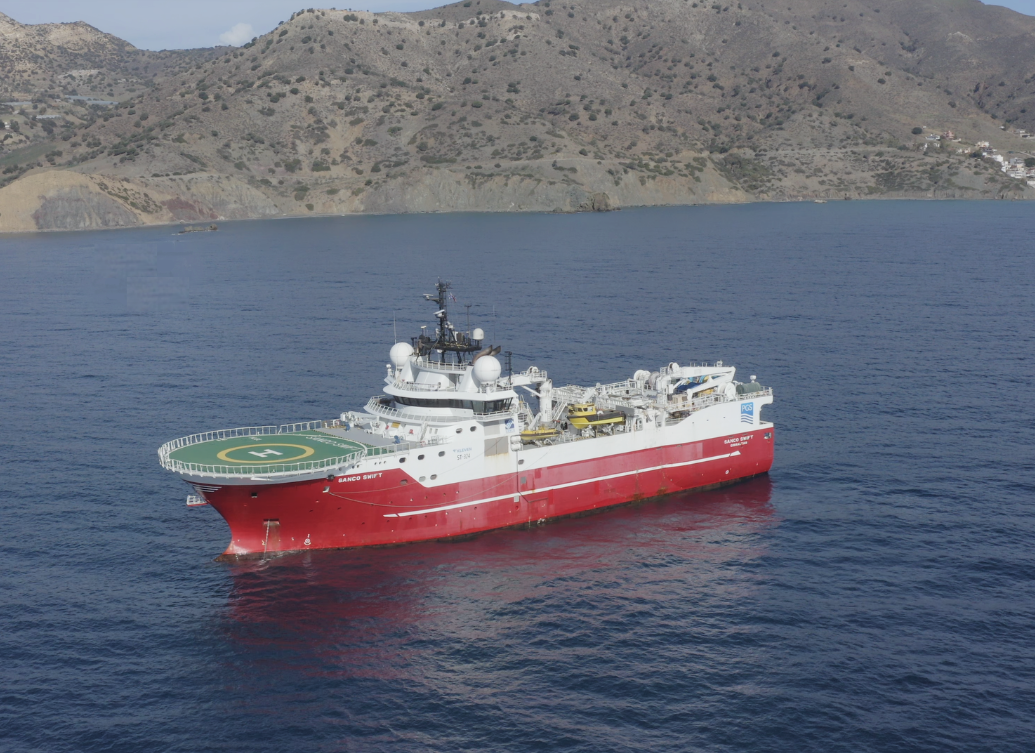Hellenic Hydrocarbons and Energy Resources Management Company (HEREMA S.A.) is pleased to announce the successful completion of the 2D seismic surveys in the offshore areas “West” and “Southwest” of Crete. The surveys were carried out by the leading global seismic acquisition and processing company PGS, on behalf of the Licensees ExxonMobil and Helleniq Energy.
From their initiation on November 10th 2022, up until their completion, subsurface imaging geophysical surveys for the exploration of potential natural gas deposits were conducted at an intensive pace, far exceeding the minimum contractual obligations. A total of 12.278 km of seismic data were collected against the minimum contractual obligation of 6.500 km for the two blocks combined. The surveys increased the density of the seismic coverage in the areas within the West and Southwest of Crete concessions, offering for the first-time seismic imaging and information over unexplored areas within the Greek EEZ.
The surveys, which lasted a little over 3 months, were successfully completed with the application of the strictest standards and safety measures for the protection of the environment and marine life. The surveys were conducted under the supervision of the competent state company, HEREMA, which had appointed its own, independent observers, who monitored the implementation and compliance with all environmental measures and regulations.
HEREMA’s CEO, Mr. Aristofanis Stefatos, stated: “As the Competent State Authority that manages the concession rights on behalf of the Greek State, we are deeply satisfied with our excellent cooperation with our investors, who increased their investments and completed the exploration program at a rapid pace. This will be followed by data processing, interpretation, and evaluation in order to make decisions about entering the next exploration phase.”
HEREMA’s Chairman, Rikard Scoufias, welcomed the survey’s completion and commented: “the successful completion of the surveys marks the conclusion of all remaining seismic exploration surveys, which is a Greek achievement of global magnitude and comes at a very important moment for Europe. We stand before an unprecedented opportunity to monetize Greece’s natural gas resources in a way that can not only bring economic and strategic benefits but also support the bigger objective to accelerate the transition to a more sustainable future. Our focus will now be on further building the resources and collaborations, at all levels, to ensure we maintain this historic momentum.”
The Minister of Environment and Energy, Mr. Kostas Skrekas, stated the following: “In April, the Prime Minister, Kyriakos Mitsotakis, announced the acceleration of hydrocarbon exploration projects. Today, the seismic surveys in Crete were completed, faster than anticipated. Within less than two years we have conducted seismic surveys in 5 areas, as opposed to only 2, from 2011 to 2020. I would like to congratulate all the stakeholders and express our anticipation for the results. Our goal is to have the first exploration drilling within 2025. We need to discover if a new potential source of wealth exists in the subsurface of our country that can be monetized for the benefit of the Greek society. The Government will continue to respond timely and realistically to the challenges of the energy crisis”.
Fields of research:
• West of Crete, area 20,058.4 sq.km., Licensees: ExxonMobil Exploration & Production Greece B.V. (70% and Operator) and HELPE West Crete S.A. (30%)
• Southwest of Crete, area 19,868.37 sq.km., Licensees: ExxonMobil Exploration & Production Greece B.V. (70% and Operator) and HELPE Southwest Crete S.A. (30%)
Environmental protection measures implemented:
• Use of the ‘soft start’ protocol to ensure that marine mammals can be temporarily removed from the geophysical survey area prior to commencement.
• Doubling of marine mammal observers aboard seismic surveillance to ensure protection of cetaceans and other marine life within the safety zone.
• A safety zone of 550 meters around the ship that carried out the seismic surveys in case of detection of large marine animals.
• Waiting period 30 minutes before the start and stop of each research activity.
• Passive acoustic monitoring of underwater sounds for the measurement of sea noise levels and the detection of marine mammals.
• Application of a 1 km exclusion zone around the ” Natura ” areas as well as fish farms.
• Air monitoring of cetaceans during and after surveys.
• Biodiversity monitoring of the area.
• Full compliance with all applicable regulations and guidelines in accordance with MARPOL VI and ACCOBAMS conventions and JNCC guidelines.
• Continuous presence of HEREMA representatives on board to ensure the implementation of environmental protection measures.
